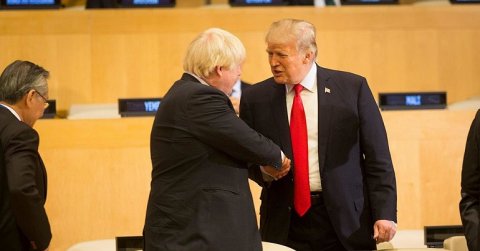
23 June 2020
Trade in goods such as cars and agricultural products is a very small part of modern trade deals. This basic trade was agreed a long time ago.
Modern trade deals are instead largely about having common rules (standards, regulations, protections) and opening up public services to private corporations (always described as “liberalisation of services”). What the Centre for Economic and Policy Research said about the EU’s failed trade deal with the US (TTIP) back in 2016 is still true of any deal between the US and the UK:
“As much as 80% of the total potential gains come from cutting costs imposed by bureaucracy and regulations, as well as from liberalising trade in services and public procurement.”
It is this “liberalisation of services”, a pro-business policy pursued and enforced by all western governments, that is behind the UK government’s push to contract more and more health services to private companies.
The use of language to mislead
The UK government has begun negotiations with the USA over the free trade treaty. It has published an initial document setting out its aims in the negotiations. According to Boris Johnson, “There are no circumstances whatever in which this government or any Conservative government will put the NHS on the table in any trade negotiation. Our NHS will never be for sale.”
The claim that “the NHS is not for sale” is legally true. The government “contracts out” NHS services to firms like Deloitte and Serco. These do not own the service, they provide it on behalf of the NHS. They can’t charge patients for the service. The real issue for NHS campaigners is the contracting out. The government claims that the NHS is not for sale but continues to contract health services to private corporations. The “not for sale” claim is just a way of misleading the public about what is really at issue.
Another common phrase used by governments in response to claims that public services are up for sale in international trade treaties is that the government “maintains the right to regulate” public services. In the UK government document, we find exactly this claim, that the government will “protect the right to regulate public services”.
This assurance is completely misleading. All rights are limited by law. And in a legal treaty concerning trade in services, the right to regulate will be constrained by the terms of the legal treaty. So the government will have the right to regulate public services within the terms set down by the treaty. For example, most trade deals contain “standstill’ or ‘ratchet’ clauses that lock in existing levels of privatisation and make it difficult for any government to roll back privatisation or deregulation in the future. For instance, some Canadian provinces offer public (state) automobile insurance that is cheaper than private insurance. Existing public insurance in these provinces was protected CETA, the EU-Canada trade deal. But now, if another province wanted to introduce public car insurance, they couldn’t do so because of CETA.
US corporate access to the NHS
The real issue for NHS campaigners is whether US corporations will have the right to access the NHS and other public services markets in the UK in a way that will increase the trend towards greater privatisation.
In its opening document, published in November 2019, the US set out its demands with regard to services. Any treaty must prohibit
“Discrimination against foreign services suppliers;
Restrictions on the number of services suppliers in the market;
and Requirements that cross-border services suppliers establish a local presence.”
If the UK wants to make any exceptions, then there must be
“… negotiation, on a negative list basis, of the narrowest possible exceptions with the least possible impact on U.S. firms.” (5)
The UK has accepted that equal access for the US is part of the deal. This is stated in the part of the UK document dealing with public procurement. Public procurement is a big issue for the UK in its relations with the US. Many state governments in the US, when contracting public services, have a policy of "buy American" and the UK wants to get into that US state procurement market. The US procurement market is valued at £1.4 trillion and the UK currently has access to only a third of this market. The US, in turn, will want access to state procurement here. Will the US have the right of access to NHS and other public service contracts in the UK? Here’s what the government document on procurement says:
"There were some comments calling for the UK’s international procurement obligations to favour UK domestic suppliers, but the UK’s domestic regulations, which apply to Government procurement, require contracting authorities and contracting entities to treat suppliers equally and without discrimination. These principles will continue now the UK has left the EU". (21)
In other words, the US will have access to government procurement of services in the UK; US corporations will be treated “equally and without discrimination”.
But all kinds of corporations have access to public service contracts. What difference would it make if US corporations were thrown into the mix? In fact, they are already part of the mix and have been for some time. Any US corporation that has a branch or subsidiary in the UK can tender for NHS contracts. US companies now run about 13 per cent of NHS mental health beds. Optum, headquarters in Minnesota, is a subsidiary of the US giant health corporation, United Health. Optum has contracts with many CCGs across England. In 2015, Optum won a place on NHS England’s Lead Provider Framework (LPF) for commissioning support services. In 2014 Optum won a £150 million three-year contract to carry out acute commissioning services for 18 Wessex and the Thames Valley clinical commissioning groups, including Oxfordshire CCG (Health Service Journal, 14 April 2014).
If US corporations like United Health already have access to NHS contracts, what difference would a US-UK trade deal make? Firstly, US corporate access to the NHS would be anchored in an international legal treaty which a future government could not change. During the past year there was some talk of the NHS moving away from competition and towards greater “integration”. There was even a suggestion that the government would abolish the need for CCGs to tender services on the private market. But if US corporate access to public service contracts were written into a US-UK trade deal, it would be difficult to see how abolishing tendering in health services could happen without legal challenge.
Secondly, there’s the hugely unpopular ISDS which sank TTIP. The Investor-State Dispute Settlement would allow US corporations to sue UK governments if, in the awarding of public service contracts, US corporations were treated unfairly, or governments didn’t adhere to the treaty, or future corporate profits were negatively affected by new government regulations. This threat in itself has a powerful influence on government decision-making and the framing of new regulations.
Digital NHS
Digital services are an increasingly important area of commerce and a key area for trade in international services. In the document setting out the US’s aims in any trade deal with the UK, it makes clear that the US wants unlimited access to UK digital data, the right to move data to the US, and the right to protect US source codes.
Digital services are a big part of government plans for the transformation of the NHS. In 2018, the Department of Health issued a document setting out plans to digitise NHS services. This involves data storage, sharing, and access, online access to clinicians, personalised health information and advice, AI, robotics, a vast array of apps, etc. The document makes clear that the technology companies will be the main drivers in this digitised NHS. Any barriers to the entry of private providers will be removed. The central role of the private sector is repeated many times in the document:
“We already have some of the world’s leading healthtech companies … And, in the NHS, we have the world’s biggest health institution. … We are committed to working with partners to make that happen.”
“We need to build nationally only those few services that the market can’t provide and that must be done once for everyone, such as secure login and granular access to data. …
“We want to make the rules and opportunities as clear and simple as possible to create a competitive marketplace for innovation where any tech company can compete and have an equal opportunity to deliver.”
“It means removing barriers to market entry for innovators and developers, including streamlining and simplifying the landscape for innovation, so that innovators and those working in health and care know how and where to find the support they need.”
“Our goal is to simplify the landscape for innovators wanting to work with the NHS and to make it significantly easier for health technology innovators to navigate the system.”
And this takeover of digital NHS will be from the centre where any regulations preventing the entry of private companies will be removed:
“For the NHS, we also want to remove the barriers to technology providers selling into the system – removing the need for innovators to travel the country selling to one trust at a time. We will support the procurement of technology through the application of procurement frameworks.”
Private companies will not only manage the technological infrastructure but will also be involved in areas that are more clinical than technological. Right now, for instance, private companies can send sample medicines to GPs but there is a suggestion that, in the digital NHS, they can make clinical recommendations direct in the individual patient record.
So the aim is clear: a health market in which high tech companies compete to run digital NHS.
As in so many other areas of the NHS, US firms are already part of the digital network. According to the Health Service Journal,
“Palantir ..[a US data mining firm] is part-way through a three-month [contract] with the CSU on behalf of NHS E/I to track, model and visualise various data related to Covid-19. …
Palantir is chaired by Peter Thiel, who is best known for setting up Paypal with Elon Musk and others. The Silicon Valley firm is known for its work with military, intelligence, and law enforcement agencies. Palantir has faced criticism over data mining software used by US immigration officials to investigate undocumented workers.” (HSJ, 27 May 2020)
Palantir also works with another company, Faculty, which the HSJ describes as “a company linked to Dominic Cummings”.
Given the size of the NHS and the complexity of the digital infrastructure that is to be created and managed, the financial investment will be huge as will the potential profits. Of course, the NHS itself doesn’t have the technological skills to create such a digital infrastructure but this leaves open the question of ownership and management. Running a digital NHS is not just a technological issue – it also involves political and clinical choices: not only questions of access to data and privacy but also who owns and manages this important sector of future healthcare.
What’s the solution?
Is it possible to protect the NHS from a trade treaty dealing with services? Yes, one way to do this is by “positive listing”. Only the services offered explicitly are ruled by the treaty. If health services were not listed, the NHS would be excluded from the treaty. The alternative is “negative listing” where everything is on offer unless it is explicitly excluded. This is the US favoured approach. In the negotiations between the EU and the US over TTIP, member states of the EU had the option to exclude specific services. The UK chose not to make any exclusions. So if the government really wanted to show that the NHS is not on the table, it could do that quite simply with a statement in the treaty that all health services were excluded from the treaty.
The US-UK trade deal will use negative listing. What we need to demand, therefore, is that the NHS should be explicitly excluded from the treaty. In the negotiations with the US over TTIP, the German government made such an explicit exemption which stated that it could adopt any measure in health and social services, even “where services may be provided by different companies or entities involving competitive elements”. This reference to competitive elements is important because free trade treaties have defined “public services” as “services carried out exclusively in the exercise of governmental authority” and not involving competition.
Finally, there’s the question of public and parliamentary input into the whole process of agreeing and ratifying an international trade deal. Reports in the media have said that the Conservative government may limit or even exclude parliamentary debate on the terms of trade treaties after Brexit.
We Own It has been campaigning for specific protections for the NHS in the government's Trade Bill, to protect it from trade deals.
Email your MP to demand they push for the Trade Bill to be amended to protect our NHS now!
This blog is adapted from a briefing written by Gus Fagan for Keep Our NHS Public Oxfordshire

Image credit: The White House - Creative Commons







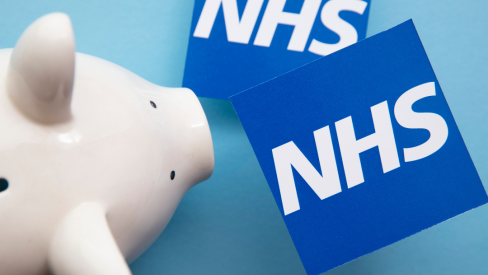


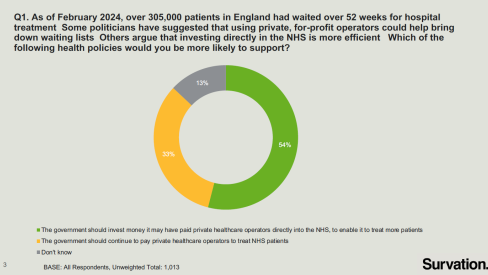
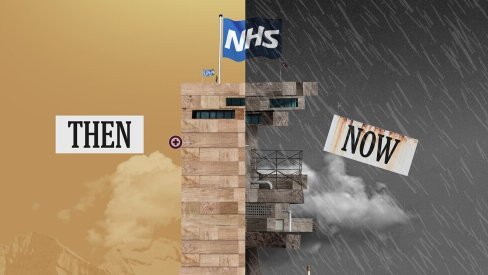
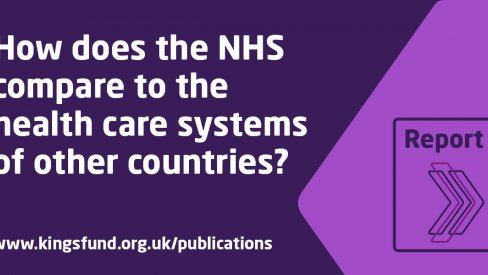

Comments
Pete Woolf replied on Permalink
I am very concerned about the trade deal with the US and want the NHS protected from being sold off. Please ensure this happens.
Josh replied on Permalink
Why do you lot do zero research and just read the media to throw around your propoganda? Take a look at the latest UK US trade proposal. It clearly articulates from the get go that the NHS is NOT on the table within any of the UK US talks. It is on the Gov website in a 180+ PDF document. But I guess it is easier to read the 8 paragraphs on a left wing biased news website.
Alice replied on Permalink
Hi Josh,
The government has repeatedly failed to tell us what mechanisms they will use to protect the NHS from trade deals. Even the model EU deal they have published does not contain specific carve-outs for the NHS - so how are we supposed to trust them when they say they’ll protect the NHS from an aggressive US negotiating team?
The fact is, there are no red lines set out to protect our NHS in trade deals, and the Conservatives have no good reason not to create these red lines. The only explanation for their refusal to do so is that they want to keep their options open in negotiations.
MPs in Parliament have failed to vote for an amendment to protect the NHS - now it’s up to the House of Lords.
We are a campaign for public ownership of public services. We represent the voices of millions of people across the country who believe that our public services, including the NHS, should be run for people not profit. The resources that we share are all carefully researched, and we aim to summarise key evidence so that anyone can understand it; not everyone has the time to read 180 pages of a trade proposal, and we don't think that people should be expected to in order to engage. It's part of our job to translate the technical jargon, which often obscures the truth, and make it accessible.
Best wishes,
Alice and the We Own It team
Add new comment